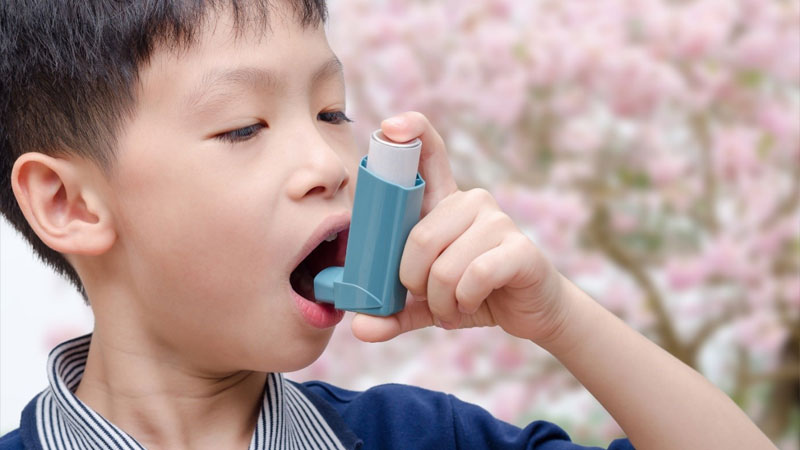Asthma is a condition that affects the body, and it’s important to maintain a suitable diet to manage it and prevent flare-ups. Here’s some advice we’d like to share with you on this topic.
1. What is Asthma?
Asthma, or bronchial asthma, is a condition where your airways narrow and become inflamed, producing excess mucus, making it difficult to breathe and triggering coughing fits. While some cases of asthma are merely an inconvenience, severe cases can significantly impact your life and even become life-threatening.
 What is Asthma?
What is Asthma?
Asthma attacks can be triggered by various environmental factors such as mold, humidity, allergens (dust mites, tobacco smoke, etc.), air pollution, and viral lung infections.
Asthma is typically categorized into several common types, including allergic asthma, exercise-induced asthma, cough-variant asthma, nocturnal asthma, and seasonal asthma.
2. Who Can Get Asthma?
Asthma is known to be a common chronic condition in children. However, adults, especially the elderly, can also develop asthma. Certain factors increase the likelihood of developing asthma, including:
- Respiratory infections.
- Skin allergies or eczema.
- A family history of asthma.
- Living in a polluted environment with high levels of smoke, dust, or chemicals.
 Who Can Get Asthma?
Who Can Get Asthma?
3. Signs and Symptoms of Asthma
Asthma symptoms can vary from person to person. Here are some of the most common symptoms of asthma:
- Shallow, rapid, and labored breathing.
- Chest tightness or pain.
- Wheezing.
- Disturbed sleep due to difficulty breathing, coughing, or wheezing.
- Cold and flu infections can worsen coughing and wheezing.
 Symptoms of Asthma
Symptoms of Asthma
If you experience the following, your asthma may be severe:
- More frequent and bothersome symptoms.
- Increased difficulty breathing.
- Frequent reliance on rescue inhalers.
4. Is Asthma Dangerous?
Asthma can significantly impact daily life when flare-ups occur frequently. Prolonged coughing can lead to fatigue during the day and sleep disturbances at night.
Although asthma is a chronic condition, it can rarely lead to death. Therefore, it’s crucial to be cautious and follow the proper treatment plan to avoid complications such as respiratory failure, lung collapse, emphysema, bronchitis, etc.
 Is Asthma Dangerous?
Is Asthma Dangerous?
Pregnant women are more susceptible to asthma during weeks 24-36 of their pregnancy, and it can lead to various complications for both mother and child, including premature birth, vaginal bleeding, preeclampsia, and low birth weight.
Reference: , What to eat and what to avoid?
5. Treating and Preventing Asthma
According to BSNT Nguyen Van Ngan, asthma cannot be cured completely. Therefore, one of the fundamental principles in managing and preventing asthma is to minimize exposure to triggers as much as possible. However, if detected early and properly controlled, the disease can be managed, and the following methods can be used to reduce unpleasant symptoms:
- Take medication as directed by your doctor: Asthma can easily flare up if you have allergies to certain medications, so follow your doctor’s instructions and avoid self-medicating.
- Avoid triggers: Asthma is prone to flare-ups when exposed to pets, smoke, chemicals, dust, cockroaches, certain foods, plants, pollen, and mold. Wear a mask when going out, keep your home clean, and avoid allergic foods.
 Treating and Preventing Asthma
Treating and Preventing Asthma
- Exercise and consume immunity-boosting foods: Engage in physical activity and maintain a healthy, balanced diet and lifestyle.
- Stay warm during cold weather: Protect yourself with scarves, hats, gloves, and thick clothing to prevent asthma attacks triggered by cold weather.
For more information, refer to 7 effective home remedies. However, consult a specialist before attempting any of these remedies, especially if you experience any unusual symptoms, seek immediate medical attention.
6. Frequently Asked Questions about Asthma
Is Asthma Contagious?
Asthma is not contagious as it is not caused by viruses or bacteria. However, it can be hereditary.
What Should Asthmatics Avoid Eating? What Should They Eat?
When dealing with asthma, it’s crucial to boost your nutrition and immunity with anti-inflammatory and antioxidant-rich foods such as turmeric, ginger, green tea, apples, and broccoli.
To improve your health when suffering from asthma, certain foods should be avoided as they can trigger attacks. These include:
 Foods to Avoid with Asthma
Foods to Avoid with Asthma
Bottled orange and lemon juice
Bottled juices often contain high levels of additives, flavorings, and chemicals. These substances can negatively impact your asthma. Opt for freshly squeezed juices to minimize chemical intake and support the function of your respiratory tract.
Alcoholic beverages
Alcohol adversely affects your nervous and respiratory systems, often leaving you with a sense of breathlessness after consumption. It’s best to abstain from alcohol if you have asthma.
Dried fruits and vegetables
Dried fruits and vegetables typically contain a preservative called sulfite. Sulfites are chemicals that can induce breathlessness in asthmatics. Avoid dried products such as apricots, pineapples, plums, and canned vegetables.
Pickled or fermented foods
These foods also contain sulfites, as do some beverages like grape juice and wine. If you react poorly to sulfites, steer clear of these foods and drinks.
 What Should Asthmatics Avoid Eating?
What Should Asthmatics Avoid Eating?
Frozen and pre-packaged foods
These often contain sulfites and preservatives like sodium bisulfite, which are harmful to the respiratory system. Avoid frozen foods like ice cream, frozen yogurt, frozen meals, and pre-packaged foods.
Allergenic foods
Some foods can trigger allergies and asthma attacks, such as shrimp, cow’s milk, eggs, crab, and wheat. If you have allergies to these foods, it’s best to avoid them.
Salt
Foods high in salt can produce phlegm when absorbed into the trachea, and when exposed to wind and cold, it can cause phlegm blockage, affecting asthmatics.
Sulfite-containing foods
As mentioned, sulfites can induce breathlessness. Naturally occurring sulfites are found in various foods, including dried fruit, corn, potatoes, shrimp, crab, leeks, onions, mushrooms, and soy products.
7. How is Asthma Different from Bronchitis?
Acute bronchitis can be cured within 5-10 days with early treatment, but coughing may persist for several weeks. However, it can become chronic if the patient smokes or is frequently exposed to dust and pollution. Bronchitis can affect people of all ages and genders, especially those with weakened immune systems.
 Asthma vs. Bronchitis
Asthma vs. Bronchitis
On the other hand, asthma is a chronic condition that patients must manage throughout their lives. It is characterized by recurring symptoms such as coughing, shortness of breath, and wheezing. Asthma is more common in children and those with a history of allergies, eczema, rhinitis, or a family history of the disease.
These were answers to questions about asthma and the necessary precautions and dietary restrictions for asthmatics. We hope that this information will help those with asthma take better care of themselves and lead healthier lives.
Source: Hanoi Tam Anh General Hospital


































